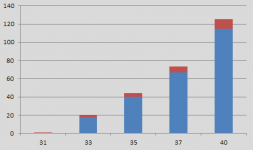matt1171
New member
I've got a 2012 Rubicon with 4.10 gears currently running 35" Toyo MTs and it's time to get new tires. I know all the debates about running 37 inch tires on the factory axles. But I keep seeing EVO promoting how Evolander is running 37s with stock axles, shafts and driveshafts and they wheel it pretty hard with no issues. So I'm curious... how much difference will it make to stick with 35" toyos which are heavy tires or move up to a 37" that is actually 10lbs lighter than the toyos. I live in Arkansas so most of my wheeling is in the national forest on trails a couple times a month and at the off-road park a few times a year running 3s and 4s on a 1-5 scale. What's going to matter the most - the larger rotational mass of the 37 or the added weight of the 35" toyo?
Let me have it.
Let me have it.

